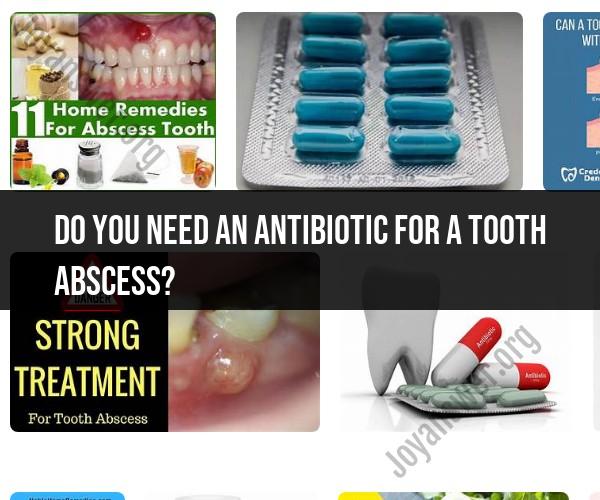Do you need an antibiotic for a tooth abscess?
I'm not a doctor, but I can provide some general information about tooth abscesses and the use of antibiotics. If you suspect you have a tooth abscess or are experiencing any dental issues, it's essential to consult a dentist or healthcare professional for a proper diagnosis and treatment plan tailored to your specific situation.
A tooth abscess is a pocket of pus that forms in or around a tooth due to a bacterial infection. The infection can occur in the pulp of the tooth (a periapical abscess) or in the gum tissue near the tooth root (a periodontal abscess). The treatment of a tooth abscess may involve the following considerations:
Drainage: In many cases, the primary treatment for a tooth abscess is to drain the pus. This can often be done through a dental procedure, such as a root canal or an incision and drainage of the abscess. Draining the abscess removes the source of the infection and can provide relief from pain and swelling.
Antibiotics: Whether or not antibiotics are prescribed depends on the severity of the infection and the risk of it spreading. In some cases, antibiotics may be recommended in addition to drainage procedures to control the infection and prevent its spread to other parts of the body. Antibiotics are typically prescribed if the infection has spread beyond the tooth or if the individual has a weakened immune system.
Pain Management: Pain management is an essential component of treatment. Over-the-counter pain relievers or prescription medications may be prescribed to manage the discomfort associated with a tooth abscess.
Dental Treatment: Once the acute infection is under control, further dental treatment may be needed to address the underlying cause of the abscess. This may involve procedures such as root canal therapy, tooth extraction, or periodontal treatment, depending on the specific circumstances.
It's important to note that antibiotics alone may not be sufficient to treat a tooth abscess. The primary treatment should focus on addressing the source of the infection through dental procedures like drainage, root canal therapy, or tooth extraction. Antibiotics are usually prescribed as an adjunct treatment when there is a risk of systemic infection or when the abscess is severe.
Self-diagnosis and self-treatment of a tooth abscess are not advisable. If you suspect you have a tooth abscess or are experiencing dental pain, swelling, or other symptoms, seek prompt evaluation and treatment from a dentist or healthcare professional to prevent the infection from worsening and to address the underlying dental issue.
Tooth Abscess Treatment: Do You Always Need Antibiotics?
You don't always need antibiotics to treat a tooth abscess. In some cases, the abscess can drain on its own and the infection will clear up on its own. However, antibiotics are often prescribed to help prevent the infection from spreading to other parts of the body.
Antibiotics and Tooth Abscess: When Medication Is Necessary.
Your dentist will likely prescribe antibiotics if:
- The abscess is severe or painful.
- The abscess is spreading to other parts of your mouth or face.
- You have a weakened immune system.
- You have a medical condition that puts you at risk for complications from a tooth abscess, such as diabetes or heart disease.
Dental Abscesses: Antibiotics and Their Role in Treatment.
Antibiotics can help to treat a tooth abscess by killing the bacteria that are causing the infection. This can help to reduce pain and swelling, and it can also help to prevent the infection from spreading.
Antibiotics are typically prescribed for 7-10 days. It is important to take the full course of antibiotics, even if you start to feel better before the end of the course. This will help to ensure that the infection is completely cleared.
In addition to antibiotics, your dentist may also recommend other treatments for a tooth abscess, such as:
- Draining the abscess: This can be done by making a small incision in the abscess and allowing the pus to drain out.
- Root canal therapy: This is a procedure that removes the infected pulp from the inside of the tooth.
- Tooth extraction: This is a last resort, but it may be necessary if the tooth is too badly damaged or if the infection cannot be controlled with other treatments.
If you have a tooth abscess, it is important to see a dentist right away so that they can properly diagnose the infection and recommend the best course of treatment.













